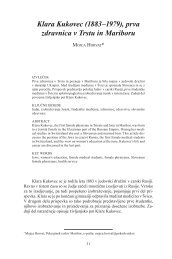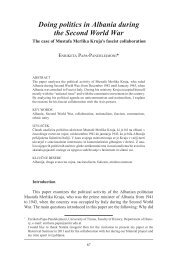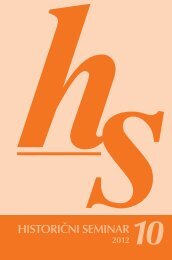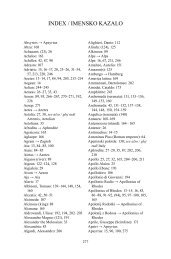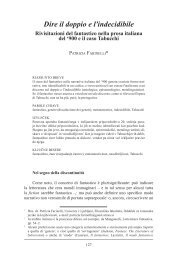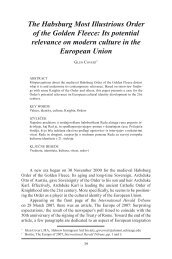The Invention of Modern Aesthetics: From Leibniz to Kant
The Invention of Modern Aesthetics: From Leibniz to Kant
The Invention of Modern Aesthetics: From Leibniz to Kant
You also want an ePaper? Increase the reach of your titles
YUMPU automatically turns print PDFs into web optimized ePapers that Google loves.
<strong>The</strong> <strong>Invention</strong> <strong>of</strong> <strong>Modern</strong> <strong>Aesthetics</strong>: <strong>From</strong> <strong>Leibniz</strong> <strong>to</strong> <strong>Kant</strong><br />
has nothing <strong>to</strong> do with art or the philosophy <strong>of</strong> art as such, a matter I<br />
will return <strong>to</strong> in my discussion <strong>of</strong> Baumgarten’s aesthetics. <strong>The</strong> tacit<br />
dimension, or, tacit knowledge, on the other hand, plays an important<br />
role in what is perhaps somewhat misleadingly called »aesthetic appreciation«<br />
<strong>of</strong> art.<br />
As we have seen <strong>Leibniz</strong> distinguishes between two forms <strong>of</strong><br />
confused ideas and two kinds <strong>of</strong> confused knowledge, obscure and<br />
clear respectively, which in their turn are contrasted with distinct concepts<br />
and distinct knowledge. A concept is distinct, he says, when we<br />
are in the possession <strong>of</strong> a nominal deinition <strong>of</strong> the concept, a deinition<br />
which is »the enumeration <strong>of</strong> suficient marks«, 30 in virtue <strong>of</strong> which we<br />
are able <strong>to</strong> distinguish clearly those things that fall under the concept<br />
from those that don’t. As an example <strong>of</strong> a distinct concept <strong>Leibniz</strong> <strong>of</strong>fers<br />
»the kind <strong>of</strong> notion which assayers have <strong>of</strong> gold«, a notion, »which<br />
enables them <strong>to</strong> distinguish gold from all other bodies by suficient<br />
marks and observations«. 31 We possess, <strong>Leibniz</strong> argues, such distinct<br />
concepts <strong>of</strong> mathematical phenomena such as number and magnitude,<br />
but also <strong>of</strong> mental phenomena such as hope and fear. <strong>The</strong> ability <strong>to</strong> <strong>of</strong>fer<br />
a nominal deinition <strong>of</strong> a concept is usually the criterion <strong>of</strong> distinct<br />
knowledge <strong>of</strong> the concept in question, the exception being primitive<br />
concepts which are irreducible and lacking in requisite marks; but in<br />
spite <strong>of</strong> this we can nevertheless have »distinct knowledge <strong>of</strong> an indeinable<br />
concept« <strong>Leibniz</strong> claims. 32 Even if the concept is distinct and<br />
our knowledge <strong>of</strong> the phenomena designated by the concept in question<br />
is a fortiori distinct, some <strong>of</strong> the components entering the deinition<br />
<strong>of</strong> the concept may not be distinct. In such cases knowledge is<br />
distinct but inadequate, since it cannot be fully articulated. Only »when<br />
every ingredient that enters in<strong>to</strong> a distinct concept is itself known distinctly,<br />
or when an analysis is carried through <strong>to</strong> the end, knowledge<br />
is adequate«, <strong>Leibniz</strong> claims. 33 <strong>Leibniz</strong>’s ideal <strong>of</strong> knowledge is thus<br />
extremely demanding, a complete (and correct) analysis <strong>of</strong> a concept<br />
is the precondition for distinct knowledge, his ideal is the ideal <strong>of</strong><br />
complete and crystalline clarity, it is not for nothing that <strong>Leibniz</strong> is<br />
regarded as the »arch-rationalist«. <strong>Leibniz</strong> realizes, however, that this<br />
austere ideal <strong>of</strong> knowledge is rarely attained, for he doubts »that a perfect<br />
example <strong>of</strong> this [sc. adequate knowledge] can be given by man«,<br />
adding that »our concept <strong>of</strong> numbers approaches it closely«. 34<br />
In his »Discours de métaphysique«, written two years after the<br />
30<br />
<strong>Leibniz</strong>, »Mediations on Knowledge, Truth, and Ideas«, p. 292.<br />
31<br />
Ibid.<br />
32<br />
Ibid.<br />
33<br />
Ibid.<br />
34<br />
Ibid.<br />
141




